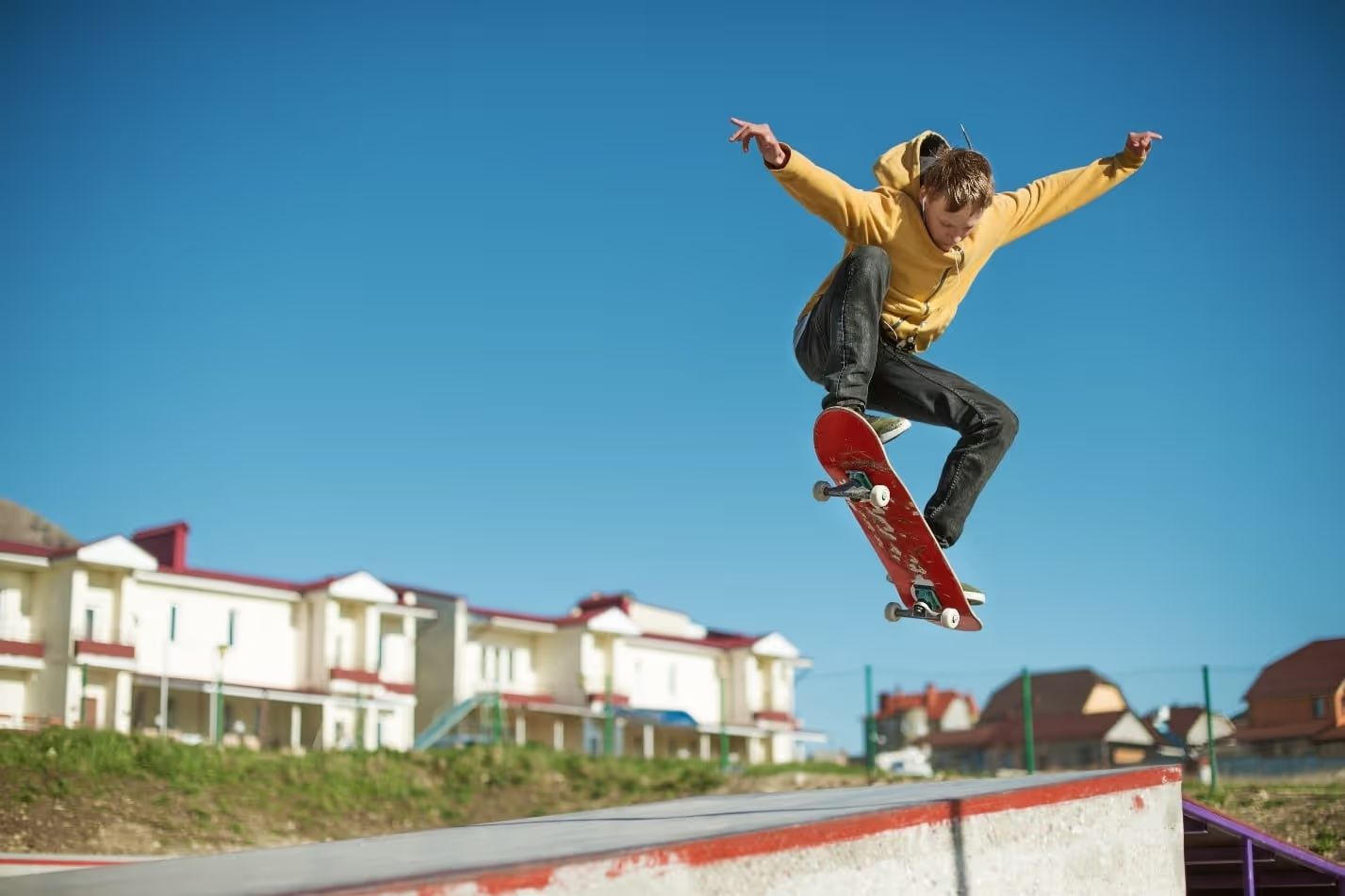Helmet Safety for Kids: Why It Matters
Millions of American children ride bicycles and skateboards. However, statistics show that parents may not realize the importance of helmets. Did you know that 85% of bicycle-related head injuries could have been prevented by wearing a bicycle helmet? (The Center for Head Injury Statistics 2014).




As an internationally recognized brain and spinal cord injury attorney, Stephen M. Smith of the Brain Injury Law Center spends each day representing individuals who have experienced catastrophic injuries, many of whom are parents of injured children. One of the toughest realizations for Stephen was discovering that in some of these cases, an inexpensive safety helmet could have prevented devastating injury.
Why Are Helmets Important?

If your child is not wearing a helmet while skateboarding, scootering or biking, you may be surprised to learn that head and brain injuries from these activities are unfortunately common and potentially fatal.
Statistics show that as the popularity of recreational sports such as skateboarding has been steadily increasing, so has an increased number of related and preventable injuries. Skateboard-related injuries among children and adolescents account for an estimated 50,000 emergency department visits and 1,500 hospitalizations in the United States each year. Young bicyclists account for 26,000 traumatic brain injury cases annually.
Bicycle helmet laws for children are intended to help reduce the number of severe and fatal head and brain injuries for children involved in bicycle or skateboarding accidents. When used properly, helmets reduce head injuries and fatalities. Several jurisdictions in the state of Virginia require riders under 14 to wear a helmet.

Professional Advice For the Youngest Riders
Young children are at higher risk of injury from skateboards, scooters and bicycles because they lack the skills and strength for safe riding, as well as the ability to judge dangers in traffic. For these developmental reasons, children under five should not ride skateboards, while those between six and ten require adult supervision. Children under eight are advised not to ride scooters.
Every child is unique. If you believe your child is ready for participating in wheeled activities, appropriate protective gear, an approved helmet by the Consumer Product Safety Commission and adult supervision could help prevent serious injury.
How to Fit Your Child for a Helmet
The U.S. government established safety standards for helmets. Your child’s helmet should have a sticker indicating it meets the standards set by the Consumer Product Safety Commission.
It is important that your child’s helmet fits correctly to ensure adequate protection. Follow the guidelines below for the perfect fit:
- Size: A helmet should fit snugly. Some helmets come with an adjustable universal fit ring while other helmets may require removable sizing pads to ensure a secure fit.
- Position: The helmet should be worn level and cover your child’s forehead. It should rest two finger widths above your child’s eyebrows.
- Side Straps: The left and right-side straps should form a “Y” and meet below the ear. These straps may be easier to adjust when removed from the head.
- Chin Strap (buckle): Buckle the chin strap and tighten until it is snug. No more than one finger should fit under the strap.

Before sending your child off to play, double-check his or her helmet.
- Does the helmet fit right? Have your child open his or her mouth wide. The helmet should pull down on the head. If it does not, re-adjust the chin strap.
- Is the helmet in the right position? When your child looks up, he or she should be able to see the front of the helmet visor. If not, unbuckle and tighten the side and chin straps.
- Does the helmet lean too far forward? If the helmet leans forward into your child’s eyes, unbuckle the helmet and re-adjust the side and chin straps.
- Does the helmet move when you shake your head? If so, you may need to apply sizing pads or adjust the universal fit ring if your helmet has one.
It is important to know when it’s time to replace your child’s helmet. It might be time to get a new helmet if:
- Your child has outgrown the helmet size
- Your child crashed while wearing the helmet
- The helmet fell onto concrete or a hard surface
Encouraging Kids to Wear Helmets
Many parents struggle to get their child to wear a helmet. If your child dislikes or refuses to wear one, find out why. Kids may think helmets are not cool, are uncomfortable, or too hot to wear.
It is important to talk about these concerns with your child and to help them choose a helmet they will want to wear.

The following tips may encourage your child to wear a helmet:
- Teach your child to wear a helmet from a young age, from the moment he or she picks up a tricycle or ride-on toys.
- Instruct your child to wear a helmet every time, even if just for a short ride.
- Be a good example as a parent and always wear a helmet yourself.
- Encourage other parents to have their children wear helmets. If your child sees his or her friends wearing helmets, he or she is more likely to wear one.
- Allow your child to pick his or her helmet. Your child can pick an attractive color or design that will make them want to wear it.
Helmets for Every Child
In an effort to spread helmet awareness, several foundations are committed to educating families and by helping underprivileged children stay safe.
Gage Duke was only six years old when he started the non-profit “Just Cuz Helmets Matter.” He created the foundation to honor his 15-year-old cousin, Allen Hall, who died while biking to school. He was not wearing a helmet. Gage was heartbroken at the sudden loss of his cousin. “We later learned that if he’d been wearing a bike helmet, it may have saved his life,” he said.
Gage started the foundation to spread the message that helmets save lives and to give away helmets to young riders. “I want the world to know that bike helmets can save lives. Every time I see a rider without a helmet, I think of my cousin, Allen, and it reminds me that I need to keep working to tell everyone about how important it is to wear a helmet.”
Another organization, Wish for Wheels is a nonprofit that gives brand new bicycles and helmets to kids in need. If you or a loved one cannot afford a helmet for your child, visit their website to learn more, or find out how you can be a part of the solution.
Notable Recoveries for TBI Victims
Suffering brain injury is serious and can be life-changing. The attorneys at the Brain Injury Law Center have helped numerous clients with proving their cases successfully.
Here are just a few of our notable recoveries:
Summary: A woman suffered a brain injury in a motorcycle accident caused by a defective tire tube. Both the motorcycle dealer and the tire manufacturer agreed to settle.
Summary: This case involved a man who suffered a mild traumatic brain injury during a fall.
Summary: A jury reached a verdict of more than $10.22 million in a case brought against Werner Transportation on behalf of a woman who suffered a mild traumatic brain injury in a crash. This was believed to be the largest-ever personal injury verdict in Norfolk, VA.
Contact Us 24/7
If there is potential compensation available that could ease your financial burden and aid in your recovery, you need to seek it.
Contact the Brain Injury Law Center today at (757) 244-7000 or by using the form on this page for a free, no-obligation consultation to discuss your case.



